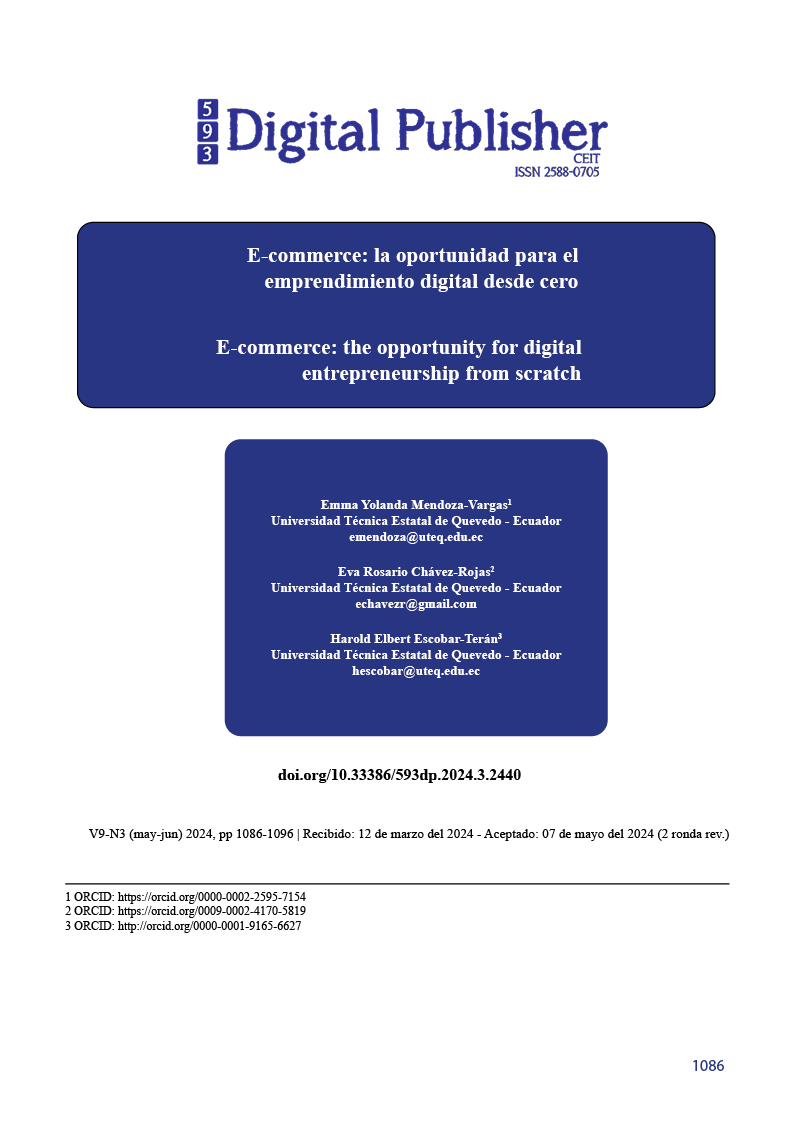E-commerce: the opportunity for digital entrepreneurship from scratch
Main Article Content
Abstract
The new forms of consumption, together with the growth of the population that surfs the Internet, the greater security of online payment systems and the wide range of businesses that operate online, have offered new opportunities for e-commerce This has allowed new entrepreneurs to make their dream come true and join this type of environment of buying and selling goods and services that is very little explored by small entrepreneurs. In recent years, those who are most advanced in this exploration have been surprised by the advantages offered by digital entrepreneurship to start a business from scratch. Due to the novelty of the topic, this article aims to describe step by step the creation of an online business, considering the current trends in e-commerce and the digital strategies that are carried out. To achieve this purpose, a qualitative approach is used, based on the documentary bibliographic method. It is concluded that the new trends of digital entrepreneurship are linked to the personalization of their products, according to the traits, desires, characteristics, interests and needs of consumers. Entrepreneurs need to constantly know how and why the needs of consumers are changing, and from there be able to make the necessary decisions to determine which products or services should be focused, how to differentiate themselves from the competition, how to reach a specific audience, select communication channels to connect with customers, etc. and finally, develop the marketing plan.
Downloads
Article Details

This work is licensed under a Creative Commons Attribution-NonCommercial-ShareAlike 4.0 International License.
1. Derechos de autor
Las obras que se publican en 593 Digital Publisher CEIT están sujetas a los siguientes términos:
1.1. 593 Digital Publisher CEIT, conserva los derechos patrimoniales (copyright) de las obras publicadas, favorece y permite la reutilización de las mismas bajo la licencia Licencia Creative Commons 4.0 de Reconocimiento-NoComercial-CompartirIgual 4.0, por lo cual se pueden copiar, usar, difundir, transmitir y exponer públicamente, siempre que:
1.1.a. Se cite la autoría y fuente original de su publicación (revista, editorial, URL).
1.1.b. No se usen para fines comerciales u onerosos.
1.1.c. Se mencione la existencia y especificaciones de esta licencia de uso.
References
Barros, O. (2003). Modelos de negocios en Internet. Santiago de Chile: Universidad de Chile.
Calle, K. C., Erazo, J. C., & Narváez, C. I. (2020). Marketing digital y estrategias online en el sector de fabricación de muebles de madera. Revista Arbitrada Interdisciplinaria KOINONIA, 5(10), 339–369.
EBAY. (2019). Guía práctica de E-commerce. Recuperado de https://www.emarketservices.es/emarketservices/wcm/idc/groups/public/documents/documento_anexo/mde3/nzm4/~edisp/dax2017738266.pdf
Esparza, D. (2021). E-commerce: experiencia en la creación de una tienda online. Cartagena: Universidad Politécnica de Cartagena.
Feijoo, I., Guerrero, J., & García, J. (2018). Marketing aplicado en el sector empresarial. Machala: Ediciones UTMACH.
Godoy et al., P. C. (2022). Análisis del E-commerce en el entorno comercial basado en la aplicación de las TICs. Polo del Conocimiento, 7(4), 973-968.
López, O. P., & Camino, A. P. (2022). Plan de marketing digital para el posicionamiento de la marca Berry. Ambato: Pontificia Universidad Católica del Ecuador.
Mendoza, E. Y., Litardo, C. E., & Bucheli, N. X. (2023). El marketing y el comercio electrónico y su rol protagónico más allá de tiempos de pandemia COVID-19. Código Científico Revista de Investigación, 4(E1), 89-111.
Mohamad, J. A., Álvaro, M. N., Amodio, J., Bovari, G. G., & Colli, C. L. (2023). Impacto de la implementación de comercio electrónico en PyMES.
Muñoz, G. (2020). Las mejores plataformas para email marketing de tu E-commerce. Innovadeluxe.
OCDE. (2021). Comercio electrónico. Recuperado de Organización para la Cooperación y el Desarrollo Económicos: https://www.oecd.org/acerca/
OMC. (2023). Comercio electrónico. Recuperado de Organización Mundial de Comercio: https://www.wto.org/spanish/news_s/news20_s/rese_04may20_s.htm#fntext-1
Oropeza, D. (2020). El comercio electrónico y principios económico-comerciales. UNAM. Recuperado de https://archivos.juridicas.unam.mx/www/bjv/libros/10/4667/4.pdf
Pincay, M. E. Z., Castro, M. G. V., & Yagual, N. M. V. (2023). E-commerce como alternativa de sustento económico durante la pandemia Covid 19 en el Ecuador. Polo del Conocimiento, 8(2), 1125-1147.
Reig, P. (2020). E-commerce. Una nueva tendencia de futuro. Valladolid: Universidad de Valladolid.
Rodríguez, B. M. (2018). Los negocios realizados por internet, ¿cambian los paradigmas existentes? Revista del Instituto de Ciencias Jurídicas de Puebla, 12(41), 71-85.
Rodríguez, J. P., & Rozo, B. F. (2020). Emprendimiento digital: Una mirada desde la innovación tecnológica. Bogotá: Universidad Católica de Colombia.
Somalo, I. (2018). El comercio electrónico: una guía completa para gestionar la venta online. ESIC.
Victory, H. (2022). Hosting Para Tienda Online. Recuperado de https://hostingvictory.com/es/mejores/tienda-online-hosting/
Villavicencio, M. (2021). Diferencias clave entre el comercio electrónico y el comercio tradicional. Recuperado de https://redintegralis.com/2021/12/01/diferencias-clave-entre-el-comercio-electronico-y-el-comercio-tradicional/




